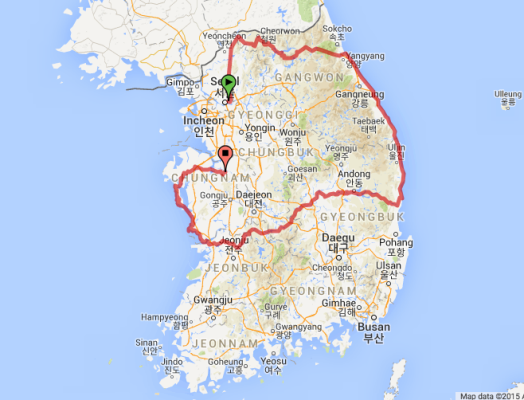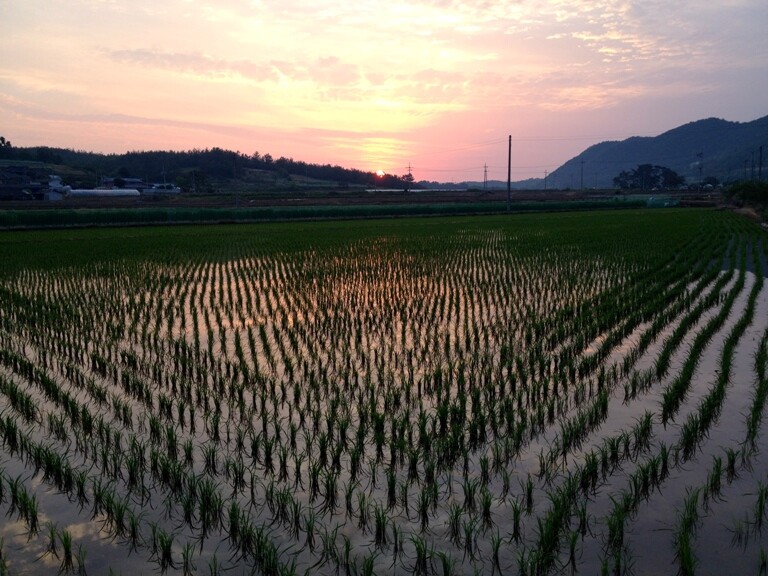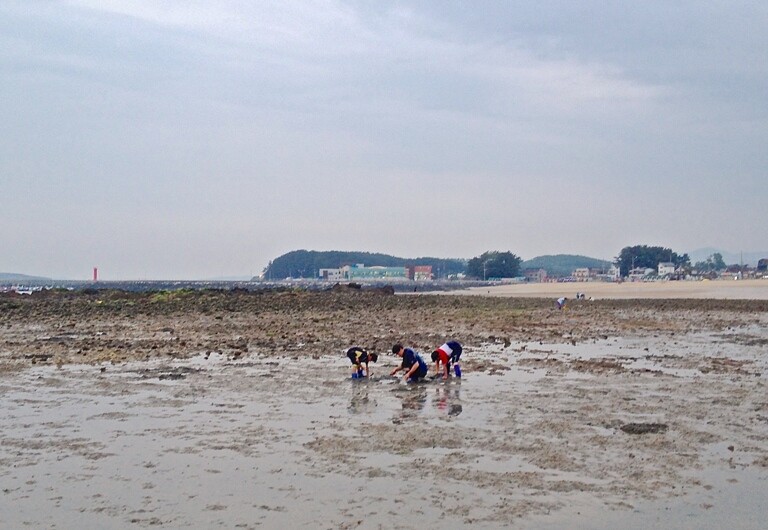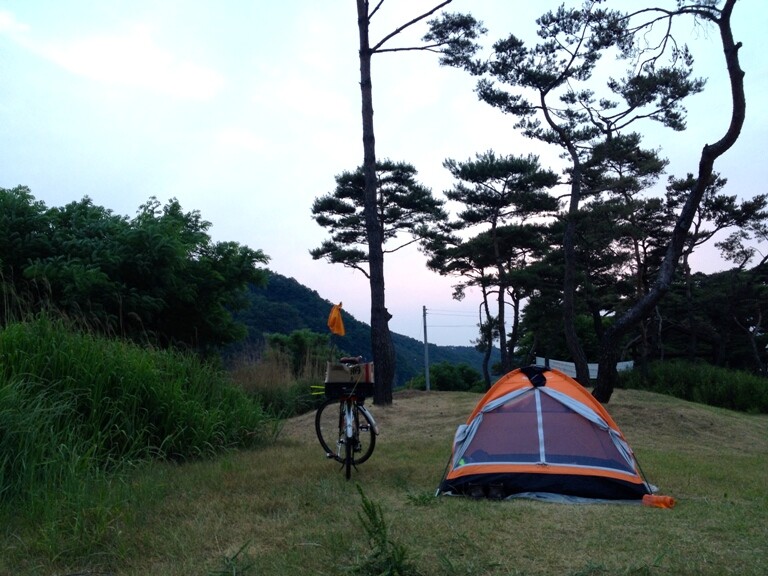hankyoreh
Links to other country sites 다른 나라 사이트 링크
[Travel] What I learned from cycling rural Korea
Living in Seoul, there is little need to think about what goes on outside the huge city. No matter where in the capital one is, all the basics of life and fashion can be bought around the corner. With a month left in my time as an exchange student in Korea, I decided to take a bicycle trip around the country to find out where my food was coming from and to learn about traditional alcohol production in the countryside.
I’m preparing to write a thesis on makgeolli, Korean rice beer, and I wanted to see how traditional brewing techniques persisted in the countryside.
On June 4, I cycled north out of Seoul. I was alone with a $15 tent, a homemade stove, a big map of Korea, and two weeks worth of ramen. In venturing to places beyond the reach of Wi-Fi, I would soon learn that the Korea out there only slightly resembles the Korea I had come to know.

A different Korea
On the second night of my journey I found myself at a table in Yanggu, Gangwon province with rowdy middle aged Korean men drinking makgeolli. When we decided that we could drink no more, I was invited to stay with one of them deep in the countryside.
The next morning I ate a breakfast of soybean soup, eggs, kimchi, and other assorted side dishes, all grown (or hatched) right in the backyard. When I asked where the rice came from, the mother of the house looked at me as if I was stupid, pointing to the rice field beyond the window.

I learned very early on my journey how connected the people of the Korean countryside are to the land, and how disconnected Seoul is from the sweat and love that goes into growing the crops that support this country.
Over the next two weeks I would cycle past kilometer upon kilometer of orchards growing grapes, peaches and apples, cornfields, onion fields- the same crops I eat every day in Seoul. No matter where I was, there was rice. In rural Korea, every bit of ground that is not impenetrable mountain (you find out very fast on a bike that 70% of Korea is mountainous) is used for agriculture - ditches, muddy beaches, even freeway margins.
The first three days of my trip took me along the DMZ to the East Sea. The country I rode through was pristine. Beautiful landscapes, fresh air, and hidden swimming holes, nature unknown to Seoul, were the most pleasant surprises of my trip.
However, from Cherwon, northeast Gangwon province, to the East Sea, and south past the coastal city of Gangneung, much of the nature, including massive expanses of beautiful coastline, is inaccessible but visible through tall military razor wire fences. The military presence in northern Korea is something not felt in Seoul. I was surprised to find during the first three days of my ride: exploding bridges, hidden bunkers, and every few kilometers another military training facility or check point.
By day six, I was sitting with my feet in the sand at Daejin Beach, North Gyeongsang Province. There I met Mr. Shin. Within minutes of explaining what I was doing, Shin offered to let me stay the night in his office in nearby Yeongdeok. After loading up my bike in his well-used pickup, we visited a mountain where local makgeolli is made. Shin showed me around the city and bought me dinner.
“Whenever I get the chance I try to help people traveling in Korea, because I know what it’s like to be alone in a foreign country. When I was abroad many people took me in. If you meet any traveling Koreans in the U.S., please do the same,” he said.
Shin was a busy man, boss of his own heavy equipment business, but nevertheless spared hours out of his day to help me. Though people in the countryside all have plenty of tasks to complete, nearly everyone I approached had time for a chat and a laugh, many going well out of their way to help me - something I can’t say I find on the streets of Seoul.
The bbali-bbali, quick-quick, attitude of the city that can be so stifling, and so intoxicating, was entirely absent in the countryside.

Where are the young people?
A few days later, on the Geum River, separating North Jeolla and South Chungcheong provinces, I met a Korean man in his thirties who like me was bicycle touring the country. We shared stories and a watermelon, and went our separate ways. He was the youngest person I had talked to in twelve days.
In the villages of rural Korea I did not meet a single school-aged person. Most of the people I talked to seemed to be older than my grandparents, but enjoyed none of the leisure that accompanies old age in the States. It was surprising to find a farmer, man or woman, whose face was not wrinkled or who walked with a straight back. Many had stories to tell of children or grandchildren studying at universities in Seoul or overseas, but those young people were absent from the farm.
When I expressed concern about the generational age gap, one older woman said that, yes it was a serious problem, while a man explained that eventually one or another grandchild who is not doing well in Seoul will come to fill the void. I was not entirely convinced.
When this generation of tough skinned, hard working Koreans is gone, who will take their place?
Comfortable in Seoul
When I returned to Seoul, my throat was hurting from a pollution allergy. Yet, that was nothing the comforts of the city - friends, easy to find drinking water, prepared food, and Western-style toilets - couldn’t help me forget. Life in the city is replete with comforts that two weeks ago I took for granted.
Over my trip I cycled more than 1,000 km, avoiding all major cities. My route, decided each morning around 5am as I saddled up, took me from the DMZ south along the East Sea coast, almost to Pohang, North Gyeongsang province, cross-country to the west coast, and home to Seoul (show on the accompanying map). I drank a healthy variety of booze and returned a little thinner, a little tanner, and with an entirely different view of the country I have lived in for the last ten months.

By Dan Sizer, Hankyoreh English intern
Editorial・opinion
![[Guest essay] Amending the Constitution is Yoon’s key to leaving office in public’s good graces [Guest essay] Amending the Constitution is Yoon’s key to leaving office in public’s good graces](https://flexible.img.hani.co.kr/flexible/normal/500/300/imgdb/original/2024/0416/8917132552387962.jpg) [Guest essay] Amending the Constitution is Yoon’s key to leaving office in public’s good graces
[Guest essay] Amending the Constitution is Yoon’s key to leaving office in public’s good graces![[Editorial] 10 years on, lessons of Sewol tragedy must never be forgotten [Editorial] 10 years on, lessons of Sewol tragedy must never be forgotten](https://flexible.img.hani.co.kr/flexible/normal/500/300/imgdb/original/2024/0416/8317132536568958.jpg) [Editorial] 10 years on, lessons of Sewol tragedy must never be forgotten
[Editorial] 10 years on, lessons of Sewol tragedy must never be forgotten- [Column] A death blow to Korea’s prosecutor politics
- [Correspondent’s column] The US and the end of Japanese pacifism
- [Guest essay] How Korea turned its trainee doctors into monsters
- [Guest essay] As someone who helped forge Seoul-Moscow ties, their status today troubles me
- [Editorial] Koreans sent a loud and clear message to Yoon
- [Column] In Korea’s midterm elections, it’s time for accountability
- [Guest essay] At only 26, I’ve seen 4 wars in my home of Gaza
- [Column] Syngman Rhee’s bloody legacy in Jeju
Most viewed articles
- 1[Guest essay] Amending the Constitution is Yoon’s key to leaving office in public’s good graces
- 2Faith the power of memory: Why these teens carry yellow ribbons for Sewol
- 3[Guest essay] How Korea turned its trainee doctors into monsters
- 4[Editorial] 10 years on, lessons of Sewol tragedy must never be forgotten
- 5US grants Samsung up to $6.4B in subsidies for its chip investments there
- 6[News analysis] Watershed augmentation of US-Japan alliance to put Korea’s diplomacy to the test
- 7How Samsung’s promises of cutting-edge tech won US semiconductor grants on par with TSMC
- 8Korea ranks among 10 countries going backward on coal power, report shows
- 9‘National emergency’: Why Korean voters handed 192 seats to opposition parties
- 10[Column] A death blow to Korea’s prosecutor politics